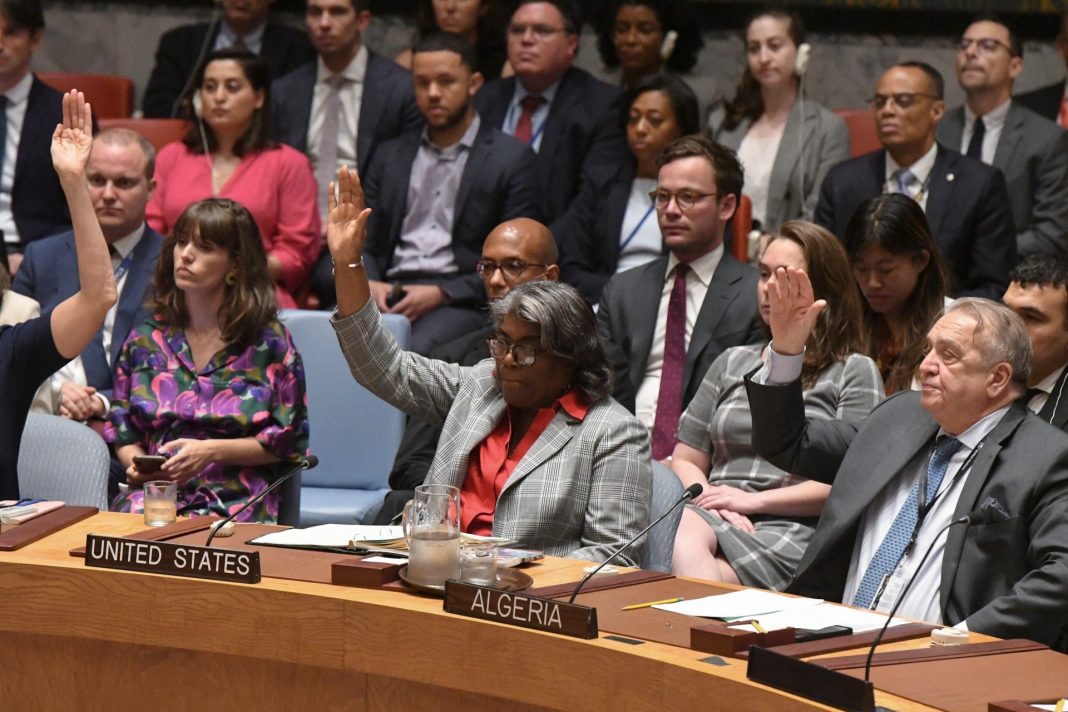The resolution, which was backed by 14 nations except Russia, welcomed the truce and hostage release proposal announced on 31 May by President Joe Biden, and urged “both parties to fully implement its terms without delay and without condition”.
Unlike earlier drafts, the resolution states that Israel has “accepted” the ceasefire proposal and calls on Hamas to do the same.
“This proposal is the best opportunity we have right now to bring at least a temporary halt to this fighting, to be able to get more assistance in, get hostages released,” deputy US ambassador to the UN Robert Wood stated.
“We want to put pressure to Hamas to accept this deal. So far it hasn’t accepted this deal. That’s why we to have this resolution, because we’re on a cusp of doing something really, really important.”
Hamas welcomed the resolution after the vote. The group said in a statement after the vote that it “welcomed” the resolution, and expressed “readiness” to implement its principles through indirect talks with Israel.
Hamas added that the resolution was “consistent with the demand of our people and resistance”, including a permanent end to Israel’s war on Gaza, a complete withdrawal of the Israeli military from the strip and a prisoner exchange deal.
Senior Hamas official Sami Abu Zuhri told Reuters the Palestinian group backed the resolution proposed by Biden and was ready to negotiate over the details.
Abu Zuhri added that it was up to the US to make sure Israel abides by it.
“The US administration is facing a real test to carry out its commitments in compelling the occupation to immediately end the war in an implementation of the UN Security Council resolution.”
US Secretary of State Antony Blinken was in Tel Aviv meeting with officials on Tuesday in a push to end the eight-month-old Israeli assault on Gaza.
Speaking from Tel Aviv, Blinken said conversations on plans for Gaza after the war ends would continue on Tuesday afternoon and in the next couple of days.
He added that Israeli Prime Minister Benjamin Netanyahu “reaffirmed his commitment” to a Gaza ceasefire deal during their meeting in Jerusalem.
Blinken also stated he believes there is a “strong consensus” amongst Israeli leaders to move forward with the plan.
“This proposal and moving forward on it is the first step,” he told reporters, saying, “We want to see it come to fruition.”
Blinken added that Hamas’s welcoming of the resolution was a “hopeful sign” and that while the US remains committed to the Palestinian group’s defeat, military means are not sufficient.
“There has to be a clear political plan, a clear humanitarian plan, in order to ensure Hamas does not in any shape or form resume control of Gaza.”
Israel criticised the proposal last week for advocating an end to the war in exchange for the release of the captives, a stance that Netanyahu’s government publicly opposed.
On 31 May, Biden detailed what he said was a three-phase Israeli proposal for a hostage exchange and eventual permanent cessation of hostilities in Gaza.
But achieving a ceasefire has been elusive for the US and mediators Qatar and Egypt.
Hamas has met the proposal with scepticism. Middle East Eye has reported that the text of the proposal received by Hamas does not guarantee a permanent cessation of hostilities as described by Biden in his speech.
And despite US claims that the proposal Biden unveiled was backed by Israel, Netanyahu has repeatedly said that Israel intends to continue fighting in Gaza until it eliminates Hamas’s governing and military capabilities.
Despite enduring eight months of Israeli bombardment, Hamas continues to put fighters in the field and reconstitute itself in areas of Gaza Israel has abandoned.
Hamas is unlikely to agree to a hostage deal if it does not guarantee that there will be a permanent ceasefire in Gaza after.
US Secretary of State Antony Blinken, traveling in the region on Monday, blamed Hamas for the failure to reach a ceasefire in Gaza.
After meeting Egyptian President Abdel Fattah el-Sisi in Cairo, Blinken said: “My message to governments throughout the region, to people throughout the region, is – if you want a ceasefire, press Hamas to say ‘yes’.”
The US has used its veto power at the UN to shield Israel from censure.
The US has cast three vetoes against calls for a ceasefire. Separately, Washington also blocked an amendment calling for a ceasefire that Russia had tried including on a Security Council resolution in December.
Amid tensions between the US and Israel over the latter’s conduct of its war on Gaza, the US has more recently signaled its frustration with Israel at the international body.
In March, the US abstained from a vote at the Security Council calling for an “immediate ceasefire” in Gaza during the Muslim holy month of Ramadan.
The Biden administration is at odds with Israel on a postwar plan for Gaza. For months, CIA director Bill Burns has been leading US efforts to secure a ceasefire deal between Israel and Hamas that could end the war and defuse regional tensions.
